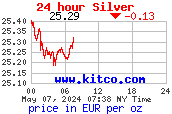...
Goldseek, 19.4.2010
juste un extrait:
Germany is a nation that fears inflation for good historical reason, and among the nations of the world, Germany places a particularly high priority on price stability. Yet, so long as Germany remains in the European Economic and Monetary Union (EMU) with the euro as its currency, Germany may not be in control of German inflation. In particular, the current crisis with Greece, and the crises that may follow with other nations such as Portugal, Italy, Spain and Ireland may prove disastrous for German investors and taxpayers. For so long as it is in the EMU, Germany may have no effective choice but to bail out countries that have been running up huge deficits – despite Germany itself not having the economic capacity to do this for all of Europe on an indefinite basis, let alone the political will to do so. These are among the reasons why in a letter to clients late last week, Morgan Stanley warned that Germany may leave the euro and the EMU and that investors should be prepared for this event.
If this event happens, it may create an enormous financial windfall for millions of individual Germans, as well as German companies, not to mention the German government. While leaving the monetary union is still far from certain as Germany also has strong economic and political incentives to stay in the EMU, in this article we will say “what if” and explore some of the startling benefits for nations and individuals of quickly exiting a failing monetary union – as well as the many perils. But while the specifics of this article are about Germany (and France), the implications go far beyond Germans and Germany (although there are very important implications for arbitrage opportunities with German companies). Rather, in this world of financial crisis and sovereign debt crisis, there are powerful related wealth and financial security implications for individuals in every country.
(Please note that the European economic and monetary union (the EMU) is not the same thing as the European Union (the EU), and Germany may potentially leave the monetary EMU without exiting the political EU.)
The German Government Windfall
First let's consider the current German government situation. Total outstanding government debt in Germany is equal to about 1.7 trillion euros, and as of 2009, equaled about 77% of the German GDP (according to the CIA World Factbook). Now let's assume that Germany does exit the economic and monetary union, and when it does so, it creates new Deutsche marks that are exchangeable one for one at the valuation for euros as of that exit date. After the exit of Germany, let's make the reasonable assumption that Germany's economy remains strong, at least relative to much of the rest of Europe. Let's also assume that with Germany exiting, and perhaps France exiting behind it, that the European monetary union is left with the weaker members where the world in general and investors in particular are quite unsure about the ability of these nations to repay their debts. So the euro plunges. [...]
...
Inscription à :
Publier les commentaires (Atom)



![[Most Recent Quotes from www.kitco.com]](http://www.kitconet.com/charts/metals/gold/t24_au_en_usoz_2.gif)
![[Most Recent Quotes from www.kitco.com]](http://www.kitconet.com/charts/metals/gold/t24_au_en_euoz_2.gif)



Lire ceci : http://www.slate.fr/story/20913/essence-dix-francs-litre-pompe-prix-inflation
RépondreSupprimerUne préparation des esprits à un retour au Franc ?
@ anonyme, j'avais lu cette info sur un autre site que celui d'Attila mais je me rends compte que je n'avais même pas percuté...
RépondreSupprimerConcernant le billet je dirais que s'il y a une chose que l'on ne pourra jamais reprocher à enculeurs c'est bien de ne pas nous avoir prévenus... Vraiment des serial killers ces mecs là.
les moutons tu peux les prevenir tant que tu veux: ils ne comprennent que les coups de pied au cul
RépondreSupprimerMaha
RépondreSupprimervous êtes sévère avec les moutons mais vous ne proposez pas de solution pour améliorer les choses si ce n'est sur le plan spirituel, mais allez dire ca aux gamins que quand ils ont faim ils n'ont qu'à prier !